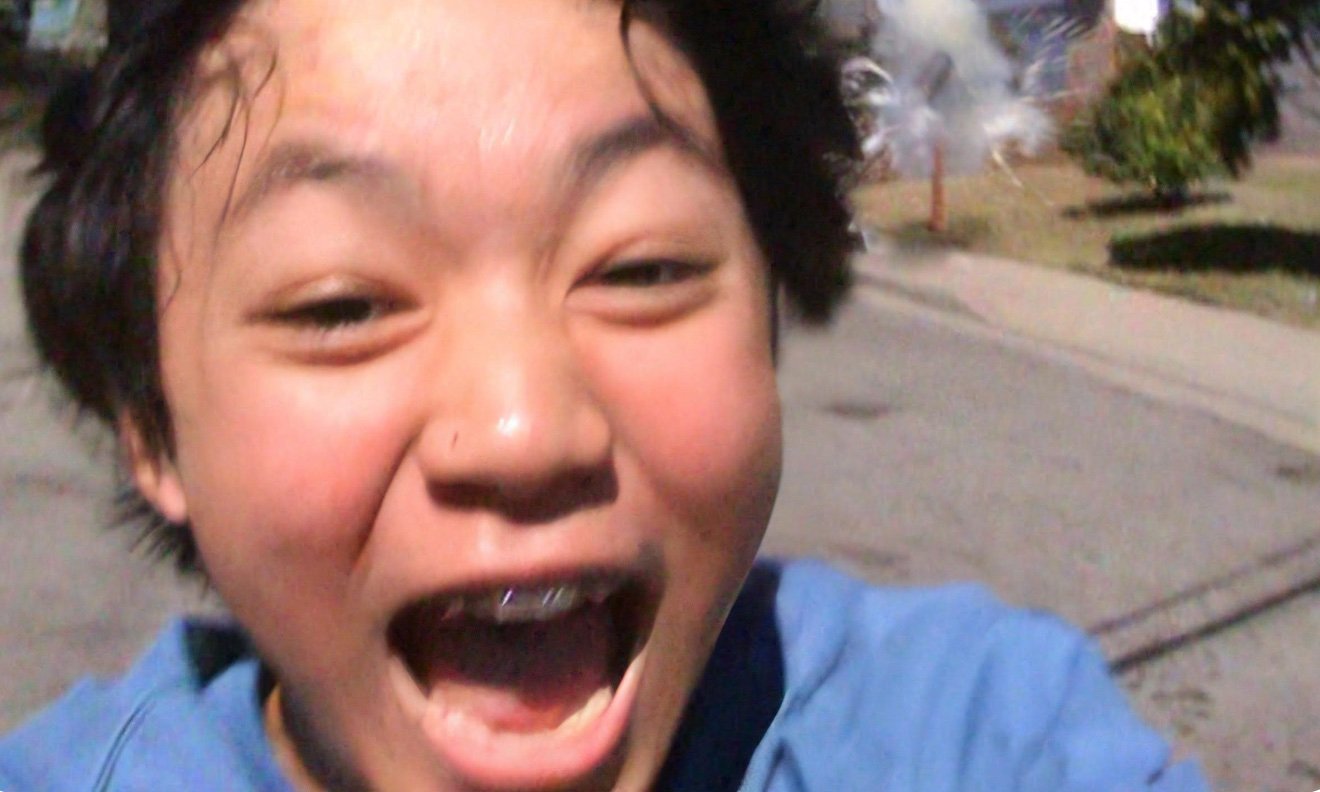DÌDI (弟弟) dir. Sean Wang
By Morgan Stone and Sienna Axe
1/23/24 @ 5:15pm, Library Center Theater
In 2008, during the last month of summer before high school begins, an impressionable 13-year-old Taiwanese American boy learns what his family can’t teach him: how to skate, how to flirt, and how to love your mom. (via Sundance)
Morgan: From the very start of Dìdi, you are drawn into the characters. Chris Wang (Izaac Wang) is a young teen on the precipice between childhood and adolescence; struggling to navigate the relationships he has with others, and with himself. He’s coming to age with the advent of the internet, and begins to develop an interest in filmmaking through posting videos of him and his friends to YouTube.
Dìdi lives and breathes 2008, and I love it so so much. The screen grabs of MySpace and early YouTube, the hairstyles, the fashion: it was so lovingly recreated. This extends to the language that 13-year-olds in the late 00s would talk to each other with, which may not always be the nicest, but certainly rings true. According to the costume designer, they used their own 2008 yearbooks to look back on what teens were wearing at the time as a basis to begin building each character’s wardrobe.
Sean Wang infused this film with so much heart and so much humor. I laughed so hard watching. Before the screening, he expressed that he loved so many coming-of-age movies when he was young, even though his life experience wasn’t portrayed on screen. He hoped that this film could achieve universality through its exacting detail. I wholeheartedly feel that Dìdi achieved this.
I am not a Taiwanese American boy, nor was I thirteen in 2008, and I still felt this movie. Seeing Chris’s insecurities around dating and struggles watching friends grow away from him made me think about my own life. It made me feel those emotions again. I loved seeing all of the 2000s media!
There’s a scene where Chris wants to know how to kiss, so he looks up a kissing tutorial on YouTube, and it made me really laugh, thinking about turning to the internet for dating advice when I was younger. There was also a shot of Chris’s love interest’s MySpace page, and she noted “I Write Sins Not Tragedies” as one of her favorite songs, and that made Sienna and I point at each other and hang our mouths open in surprise. The use of this 2000s media doesn’t feel forced, and it really enhances the story.
In some films that attempt something similar, we see the characters navigating the early internet only because it’s what they did at the time. It feels more cosmetic. However, in Dìdi, you get to see how Chris uses the internet and his friends, which lends to how the audience understands the characters. It felt tactfully done, and I am excited to see more movies being set in the 2000s and early 2010s, as I believe that filmmakers will get very creative with how they portray social media.
The film was loosely based on the filmmaker’s own life, and that is clear though how lovingly it was constructed.
We watched this film on January 23rd, which was the day that the Oscar nominations were announced, and Sean Wang received a nomination for Best Documentary Short. In Dìdi, there is a scene where Chris’s mom is talking to one of her friends about Chris’s future, and she notes how he loves making videos, how he will one day be a filmmaker, and how Chris will thank her in his Oscar acceptance speech. At this line, the theater erupted in applause, and I genuinely hope we see a world where Sean Wang is able to thank his mom in an acceptance speech.
Congratulations to Sean Wang on his recent Oscar nomination for his documentary short Nǎi Nai & Wài Pó!
Sienna: I can’t stress enough how clean this movie is. Its unapologetic-yet-tasteful use of early 2000s nostalgia brings you back to a world of bedazzled iPods, Meatspin, and the Windows 3D Pipes screensaver. Its ultra-precise editing keeps you hooked from beginning to end. It’s shot and lit beautifully: one particularly memorable scene sees protagonist Chris (Izaac Wang) and his crush, Madi (Mahaela Park) sitting at the top of a slide in the middle of the night, lit by the glow of a streetlight filtered through the slide’s yellow plastic.
The performances are delightful; it’s always amazing when directors can get such mature performances out of such young actors. And I would be remiss not to mention the character of Chris’ mother, Chungsing (Joan Chen). Often, even the most parent-sympathetic coming-of-age films still view the mother too much from the child’s perspective, sacrificing parts of her personhood; Dìdi does no such thing. It’s rare to see a film strike such a perfect balance between woman and mother without her being the protagonist. Maybe it’s just me getting older, but I left the movie wanting to be her friend. I’m impressed at Wang’s ability to capture such a grounded picture of early 2000s childhood—but I’m even more impressed by his uniquely empathetic portrayal of early 2000s motherhood.
As Morgan said, she and I had the opportunity to see Dìdi on the same day that Sean Wang’s short documentary Nǎi Nai & Wài Pó was nominated for an Oscar. The room was buzzing, reacting to shots of real-time AIM conversations like the Super Bowl. It’s a wonderful, electric film, and I can’t wait for everyone else to get to see it.

